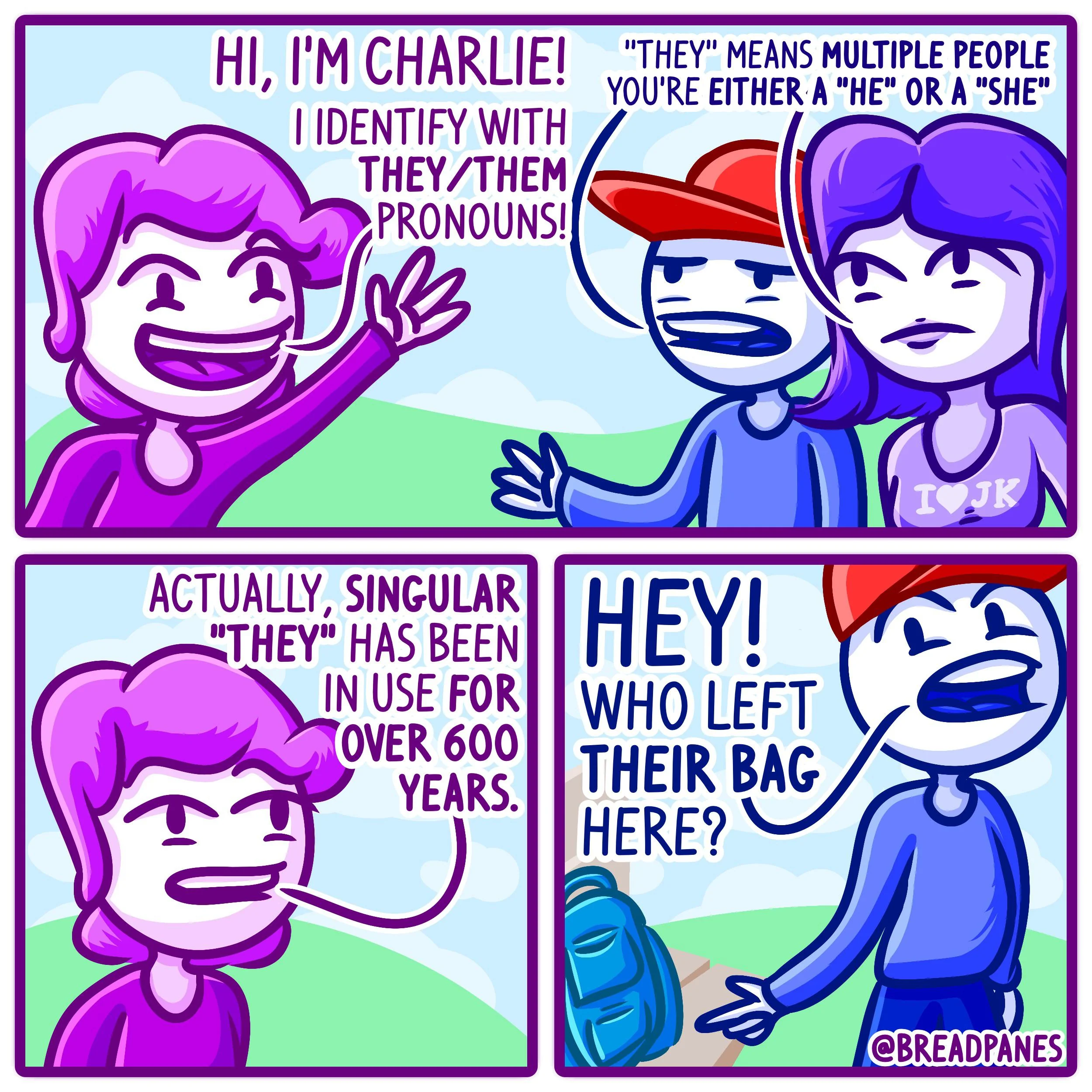They/Them
-
Wait, was ‘Ye Olde …’ really still pronounced ‘The old’? Holy crap, why did nobody ever correct how stupid I am. I thought people just said things funny back then. Sigh
-
[email protected]replied to [email protected] last edited by
That's the annoying part of English. How we got here is perfectly logical for the most part, and that does absolutely nothing to make any of it make sense.
-
Why the question mark?
-
LOL people talk like this. I think perhaps you meant to say that nobody you know talks like this.
-
The conjugation of Be, "is" is not used in the second person (you, be it singular or plural) any more than "am" is. ("am" is first person singular form.)
The correct Be conjugations for second person are "art", and "are"
-
[email protected]replied to [email protected] last edited by
Thee has had thee mind blown?
-
It's "thee is tall."
He, she, thee.
-
Ahhh, that makes so much more sense.
-
So is thou/you plural or singular? I'm very confused. I'm not a grammar person lol. This conversation began because someone said thou is singular.
-
To convey uncertainty, because the dictionary classification of the word was a bit of a mouthful, and I was only 90% certain that I was interpreting it correctly.
-
Dan (or Steve, or both) is the subject of this sentence, not the object.
In both sentences, the pronoun used has two possible meanings in that context. That the two "they" definitions might be listed separately in a dictionary does not seem very important. It wouldn't even need to be separate, as "third person pronoun, indeterminate number and gender" would accurately cover both cases.
What would be a non-ambiguous version of the sentence, in your opinion?
-
Thou is singular and you is plural.
Thou art.
You are. -
Only bogans tend to use it though.
-
Dan (or Steve, or both) is the subject of this sentence, not the object.
You may be right about that (I'm not sure) but it doesn't effect the argument.
In both sentences, the pronoun used has two possible meanings in that context.
What are the two meanings (senses) of the word "he" in your sentence? It only seems to have one meaning from what I can tell.
As I understand it, in both sentences there are two subjects (using your terminology) but in my sentence, the pronoun has more than one sense whereas in your sentence the pronoun has only one sense. The multiple senses of the pronoun in my sentence is the cause of the problem, not the multiple subjects.
In my sentence it's also possible that there is the same ambiguity of subjects as in yours but that is not a given because it depends on which of the senses of the pronoun is intended. And that isn't clear. Which is the problem.
-
What are the two meanings (senses) of the word "he" in your sentence?
Dan or Steve is what I mean here — meanings within the context of their usage, not in an isolated sense. These meanings would both be described as "third person singular male pronoun" in a dictionary, but by the nature of a pronoun the whole point is for it to refer to something you've already talked about in context
The multiple senses of the pronoun in my sentence is the cause of the problem, not the multiple subjects.
We can test for this. If there's only one subject, Dan, then the sentence becomes:
"I was with Dan (they/them) the other day. They hadn't brought a poster they needed and went back to the car to get it."
No ambiguity there, it can only mean Dan. Similarly, with a single subject that consists of multiple people:
"I was with the newlyweds the other day. They hadn't brought a poster they needed and went back to the car to get it."
Exact same thing, no ambiguity. So we can use "they" in both senses and it's totally fine so long as there's only one subject. The ambiguity comes about when there are two possibilities already mentioned that the pronoun could potentially refer to — just like if Dan and Steve are both "he".
-
thanks for not doing anything then

-
[email protected]replied to [email protected] last edited by
No, that's incorrect.
It's "Thou are (art) tall"
Nominative Oblique Possessive Thou Thee Thy/Thine* I Me My/Mine* He Him His She Her Her/Hers** You You Your/Yours**- Used as an object (It is thine) or historically, when the following word started in the vowel (Thine eyes sparkle like diamonds)
** Used as an object (it is hers)
-
[email protected]replied to [email protected] last edited by
Yes I too, read the Wikipedia entry for thou/thee.
Are the Outlander writers just dumb or something then? Or is what you're referring to ("thou art") just a different context.
Because in Outlander, the quakers clearly use "thee is" and not "thou art/are".
Because they use it as the second person singular.
Minor spoilers for latest season of Outlander
-
Do you remember your conjugation tables from Spanish or French class?
English has them too, but the modern ones are much smaller than most (all?) other European languages.


